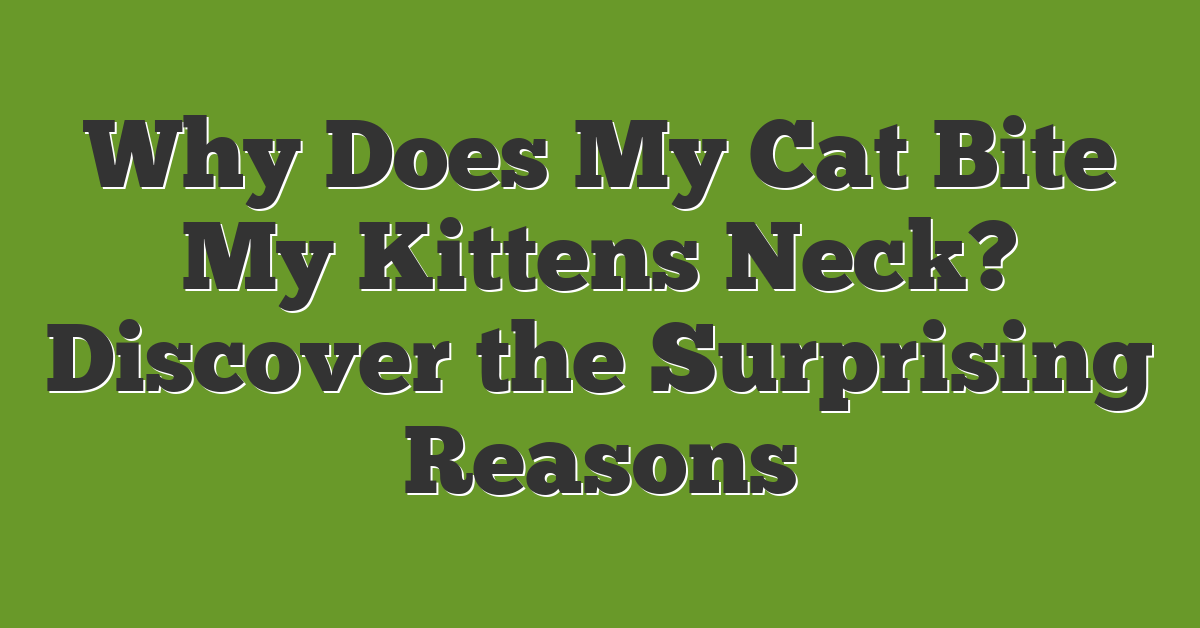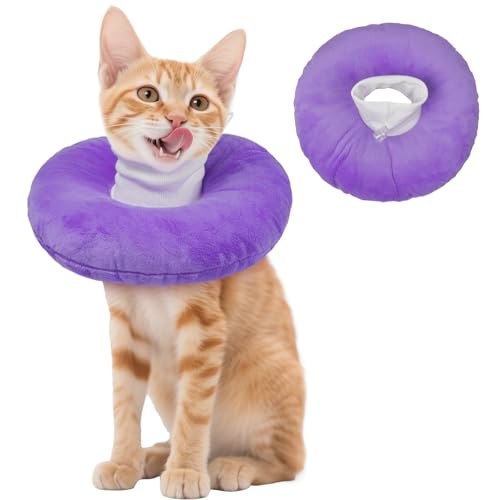Reasons why cats bite their kitten’s necks
It’s not uncommon to see a cat biting their kitten’s neck, and while it may be alarming to witness, there are a few reasons behind this behavior. Understanding these reasons can help you ensure a harmonious relationship between your cat and kitten. So let’s dive in and explore why cats exhibit this behavior:
1. Establishing Dominance: When a cat bites their kitten’s neck, it’s often a way to establish dominance and assert their authority. It’s a behavior rooted in their instinctual need to maintain hierarchy within the family group. While it may seem aggressive, it’s a natural and necessary behavior for cats.
2. Playing and Bonding: Another reason why a cat bites their kitten’s neck is simply to play and bond with them. Cats have a strong prey drive, and play is an essential part of their development. By engaging in these behaviors, cats are teaching their kittens essential hunting skills and fostering a sense of trust and companionship.
3. Grooming Instinct: Cats are meticulous groomers, and biting their kitten’s neck is a way for them to mimic grooming behavior. By gently nibbling on their necks, cats are mimicking the act of grooming, which helps stimulate blood flow and promotes cleanliness in their kittens.
4. Teaching and Discipline: Sometimes, when a cat bites their kitten’s neck, it’s a form of discipline and teaching. Cats have their unique ways of establishing boundaries and teaching their young ones what is acceptable behavior. It’s their way of setting limits and ensuring that their kittens grow up understanding the rules of the feline world.
By understanding these reasons, you can have a better perspective on why your cat engages in this behavior. It’s important to remember that these behaviors are rooted in the natural instincts of cats and can be considered normal. However, if you have concerns about your cat’s behavior towards their kittens, it’s always a good idea to consult with a veterinarian or a feline behaviorist.
Remember, patience and understanding are key when building a bond between your cat and kitten. With the right approach, you can help facilitate a loving and respectful relationship between your feline companions without compromising their natural instincts and behaviors.
Establishing dominance and asserting authority
Cats are inherently territorial animals, and as a cat lover, it’s important to understand their natural behavior. One reason why your cat may bite your kitten’s neck is to establish dominance and assert authority within the family unit.
By biting the neck, your cat is sending a clear message to the kitten – “I am in charge here.” This behavior is a way for the adult cat to maintain control and establish their position as the leader.
It may seem harsh, but it’s a natural instinct for cats to establish their dominance. Think of it as a cat’s way of maintaining order within their social structure.
While it may be difficult to witness your cat asserting their dominance over the kitten, it’s crucial to allow them to establish their hierarchy. It’s their way of teaching the kitten about boundaries and rank within their feline society.
As a responsible cat owner, you should ensure that this behavior remains within safe limits. However, keep in mind that occasional neck biting is normal and does not necessarily imply aggression or harm to the kitten.
Remember, each cat has their unique personality, and establishing dominance is just a part of their natural behavior. If you’re concerned about your cat’s behavior towards the kitten, it’s always a good idea to consult a veterinarian or a feline behaviorist for professional advice.
Understanding the reasons behind a cat biting a kitten’s neck, such as establishing dominance and asserting authority, can help foster a harmonious relationship within your feline family. By allowing your cat to assume their role as the leader, you are promoting a healthy hierarchy and ensuring a peaceful coexistence between your cats.
Playful interaction and mimicry of hunting behaviors
Having a cat and witnessing their interactions with kittens can be quite fascinating. As a cat lover, you may have noticed that your adult cat sometimes playfully bites the neck of your kittens. But why do they engage in this behavior? Let’s explore a possible explanation.
One reason behind a cat biting their kittens’ necks is playful interaction. Cats are natural hunters, and this behavior can mimic the way a mother cat would carry her kittens in the wild. By gently biting the neck, the adult cat is simulating the act of picking up and moving her offspring. It’s a way for them to engage in a playful bonding experience with their kittens.
This behavior also serves as a mimicry of hunting. Cats are known for their hunting prowess, and these playful neck bites can be a way for the adult cat to teach their kittens hunting skills. By grasping the neck, the adult cat is mirroring the way she would catch and subdue prey in the wild.
During these interactions, you may notice that the kittens instinctively respond by wiggling or trying to escape. This is a natural reaction as they learn to adjust their bodies and develop coordination. These playful encounters help kittens build their strength, agility, and hunting instincts.
It’s important to note that this playful neck biting is generally gentle and harmless. It’s a part of the cat’s natural behavior and has been observed across various cat breeds. However, always keep a close eye on the interaction and ensure that it doesn’t escalate into aggression.
Understanding why a cat bites their kittens’ neck can help you appreciate the complexity of their behaviors and the unique bond they form. By observing these interactions, you are witnessing the instinctual nature of cats and their nurturing instincts.
Remember, if you have any concerns about the behavior of your cat or her interactions with the kittens, it’s always a good idea to consult with a veterinarian or a feline behaviorist for further guidance.
Key Takeaways
- A cat biting her kittens’ necks is often a form of playful interaction and mimicry of hunting behaviors.
- The gentle bites mimic the way a mother cat carries her offspring and can serve as a bonding experience.
- These interactions help kittens develop strength, agility, and hunting instincts.
- While the behavior is generally harmless, it’s important to monitor it and ensure it doesn’t escalate into aggression.
- If you have concerns about your cat’s behavior towards her
Understanding the behavior for a harmonious relationship
If you’ve ever wondered why your cat bites your kitten’s neck, it’s important to understand their behavior to ensure a harmonious relationship between them. As a cat lover, enthusiast, and expert, let me shed some light on this intriguing behavior.
Playful Interaction
One reason why cats bite their kittens’ necks is for playful interaction. By gently gripping the neck, the adult cat encourages the kitten to wrestle and engage in a playful tussle. It’s their way of saying, “Let’s have some fun!” This behavior helps strengthen the bond between the adult cat and the kitten, fostering a loving and playful relationship.
Mimicking Hunting Behaviors
Another reason for this behavior is the adult cat’s innate instinct to mimic hunting behaviors. When cats hunt, they often bite their prey’s neck to immobilize it. By biting the kitten’s neck, the adult cat is teaching it vital hunting skills. This is a natural way for the adult cat to pass on its knowledge and instincts to the younger generation.
Helping Develop Skills
Biting the kitten’s neck also helps develop their strength, agility, and hunting instincts. Through gentle play-fighting, the adult cat is helping the kitten learn crucial physical skills, such as pouncing, stalking, and grappling. These skills are essential for their survival in the wild, and even though our domesticated cats no longer need them for survival, they still retain these natural instincts.
Monitoring for Aggression
While this behavior is generally harmless, it’s crucial to monitor the interaction between your adult cat and kitten to ensure it doesn’t escalate into aggression. If you notice any signs of aggression, such as hissing, growling, or the biting becoming too rough, it’s essential to intervene and redirect their attention to a more appropriate form of play.
Seeking Professional Help
If you have concerns about your cat’s behavior towards its kittens, it’s always a good idea to consult with a veterinarian or a feline behaviorist. They can provide valuable guidance and ensure that your feline family members have a healthy and harmonious relationship.
Conclusion
Understanding why your cat bites your kitten’s neck is crucial for maintaining a harmonious relationship in your feline family. This behavior is primarily a playful interaction and an instinctual way for your cat to teach hunting skills to their young ones. By engaging in this behavior, your cat is strengthening the bond with the kittens and helping them develop important physical abilities.
It’s important to remember that this behavior is generally harmless. However, it’s essential to monitor the interaction between your cat and the kittens to ensure it remains playful and doesn’t escalate into aggression. If you have any concerns about your cat’s behavior towards its kittens, seeking professional help from a veterinarian or a feline behaviorist is recommended.
By understanding the reasons behind your cat biting the kitten’s neck, you can provide a safe and nurturing environment for your furry family members. Embrace this behavior as a natural part of their development and enjoy watching your kittens grow into strong, agile, and independent cats.
Frequently Asked Questions
Q: Why do cats bite their kittens’ necks?
A: Cats bite their kittens’ necks for playful interaction and mimicry of hunting behaviors. It helps strengthen the bond between the adult cat and the kitten and promotes the development of physical skills.
Q: Is it normal for a cat to bite a kitten’s neck?
A: Yes, it is normal for a cat to bite a kitten’s neck as long as it remains playful and does not escalate into aggression. This behavior allows the adult cat to engage in bonding and teach hunting skills to the kittens.
Q: Should I be concerned if a cat bites its kittens’ necks?
A: It is important to monitor the behavior to ensure it remains playful and harmless. If there are concerns about the cat’s behavior towards its kittens, it is recommended to consult with a veterinarian or a feline behaviorist for professional advice.
Q: How can I encourage a harmonious relationship between cats and kittens?
A: To promote harmony, understand that biting the kitten’s neck is a natural behavior for playful interaction. Provide appropriate toys, ample space, and supervision to ensure a positive and safe environment. Seek professional help if any concerning behavior arises.














